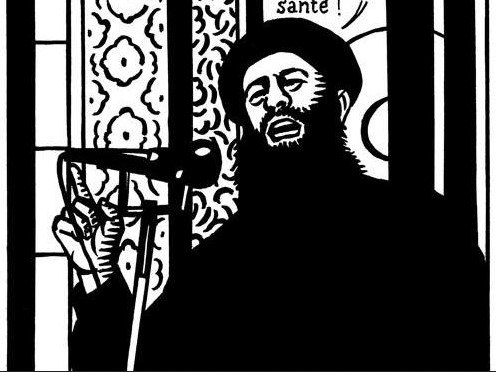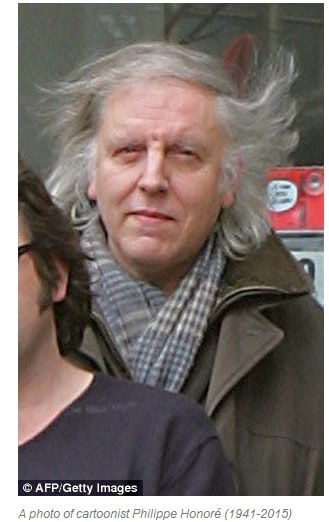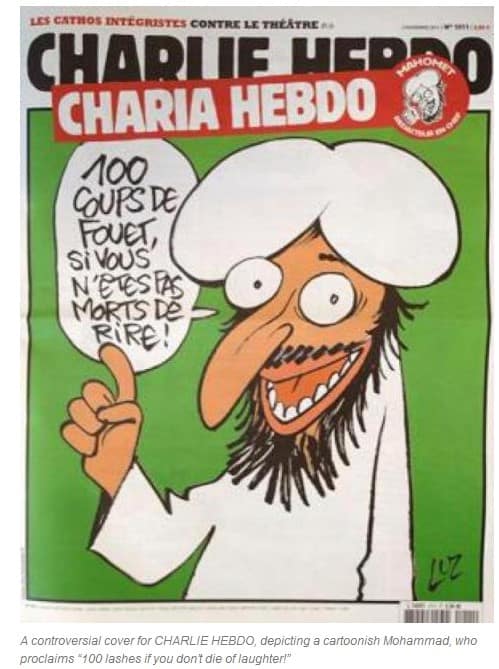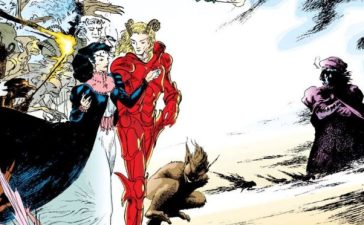
The Last Cartoon From Charlie Hebdo
Many reports about the lethal attack by masked gunmen on the headquarters of the satirical French magazine Charlie Hebdo have noted the last cartoon tweeted by the magazine before the attack. The cartoon depicts terrorist ISIS leader Abu Bakr al-Baghdadi in stark black-and-white, speaking into a microphone; translated to English, a caption reads, “Best wishes. To you, too, Al-Baghdadi”, to which Al-Baghdadi responds, “And especially good health.”
The cartoon has been re-tweeted and favorited by thousands after the attack. Although the cartoon is inoffensive (especially compared to other, more provocative cartoons published by Charlie Hebdo), a BBC news blog notes that there has been speculation about whether the image might have inspired the attack. The BBC also reports that there are questions about whether the cartoon is authentic, citing a French news source that suggests the cartoon might have been the work of hackers.
Meilleurs vœux, au fait. pic.twitter.com/a2JOhqJZJM
— Charlie Hebdo (@Charlie_Hebdo_) January 7, 2015
The cartoon was tweeted Wednesday morning, and the BBC reports that it is unclear whether the cartoon was tweeted before or after the attack began. The BBC cites the French language Belgian newspaper La Soir, which reports that the cartoon was posted on the Charlie Hebdo Facebook and Twitter accounts, and also speculates that these sites “may have been hacked.”

The cartoon bears the signature of cartoonist Philippe Honoré, a long-time contributor to Charlie Hebdo. According to the Daily Mail, the 73 -year-old artist published his first cartoon at the age of 16. Honoré was killed in the attack.
At this time, questions about the authenticity of the cartoon seem unfounded. The La Soir article cited by the BBC provides no documentation to support its claim that the Charlie Hebdo Twitter and Facebook accounts may have been hacked, or that hackers might have fabricated the cartoon. Also, given that the cartoon apparently was not used by Charlie Hebdo prior to the day of the attack, it is doubtful that the cartoon inspired the attack.
However, there is increasing evidence that the attackers may have been Islamic extremists wanting to silence Charlie Hebdo. News sources are reporting that the attackers yelled that “the Prophet has been avenged.” In the past, the magazine has published cartoons depicting the Muslim Prophet Mohammed in an unflattering manner, angering many Muslims. In 2011, the Charlie Hebdo office was firebombed with a Molotov cocktail after running an issue depicting a cartoon of Mohammed on the cover.

The latest issue of Charlie Hebdo featured a satiric cartoon cover of French author Michel Houellebecq, whose new novel Submission imagines France run by a Muslim leader under Sharia law, and depicts a France where women are banned from the workplace, as well as a protagonist who converts to Islam after discovering the pleasures of polygamy. In the past, Houellebecq has called Islam “the stupidest religion”. The novel, named after the 2004 Dutch documentary that criticized the treatment of women in Islam, was released the same day as the attack, and some news sources suggest that the attack may have been linked to the novel.

Although it is unlikely that the last cartoon tweeted by Charlie Hebdo prompted the attack, it is indisputable that Charlie Hebdo has published provocative and divisive cartoons that have angered many readers. The magazine has a history of satirizing political figures, as well as religious figures from multiple faiths; note the unflattering cartoon of the Virgin Mary and baby Jesus in the bottom left corner of the above cover image.
But the attack on Charlie Hebdo has produced tremendous solidarity in the comics community. Using the hastag “Je Suis Charlie” (“I am Charlie”), cartoonists and comics creators have expressed their support on Twitter for artistic freedom and the victims of the Charlie Hebdo attack. Many of these tweets contain cartoons.








